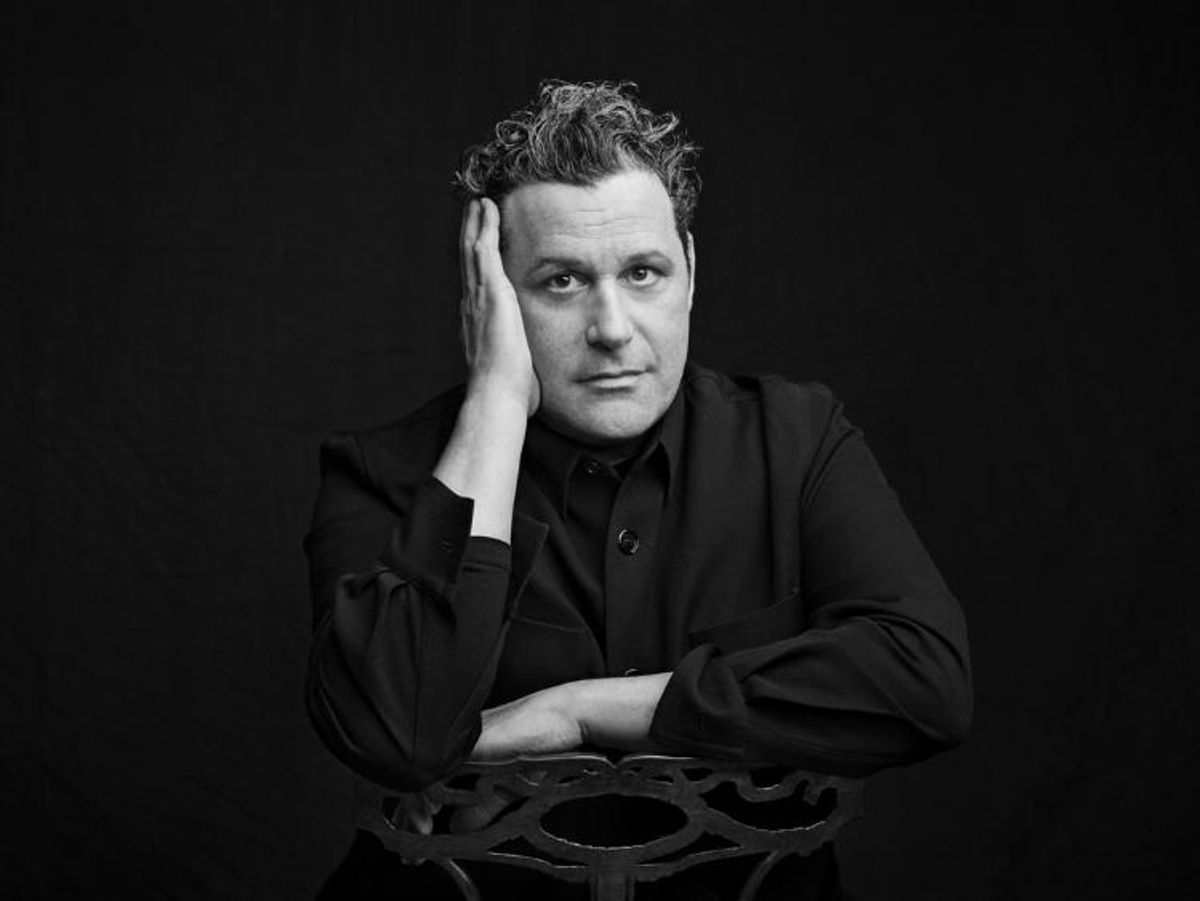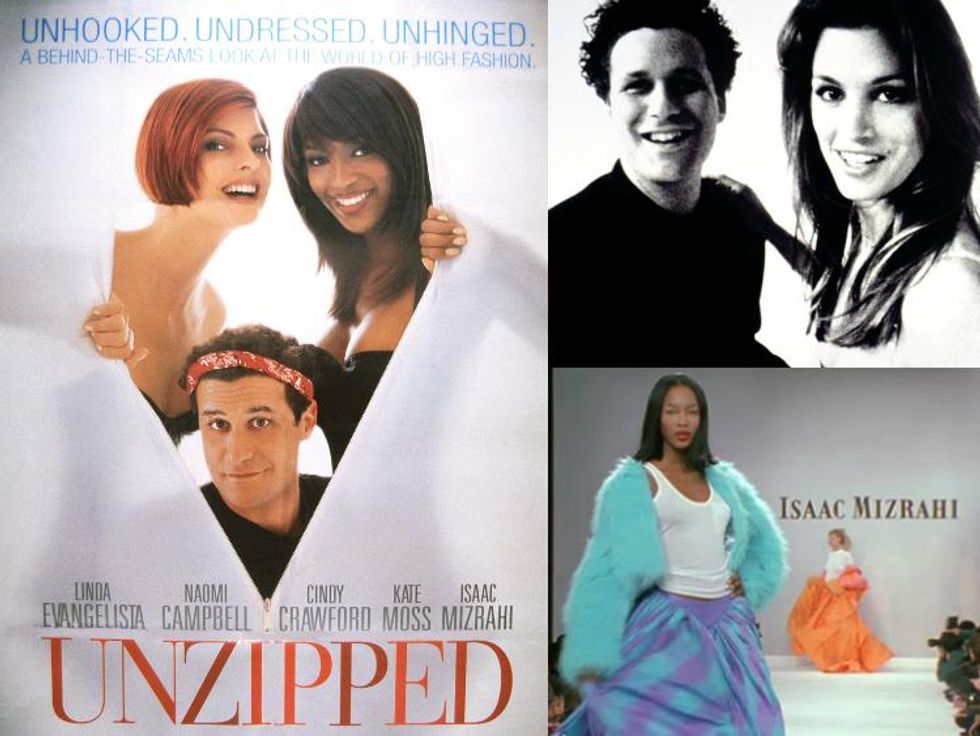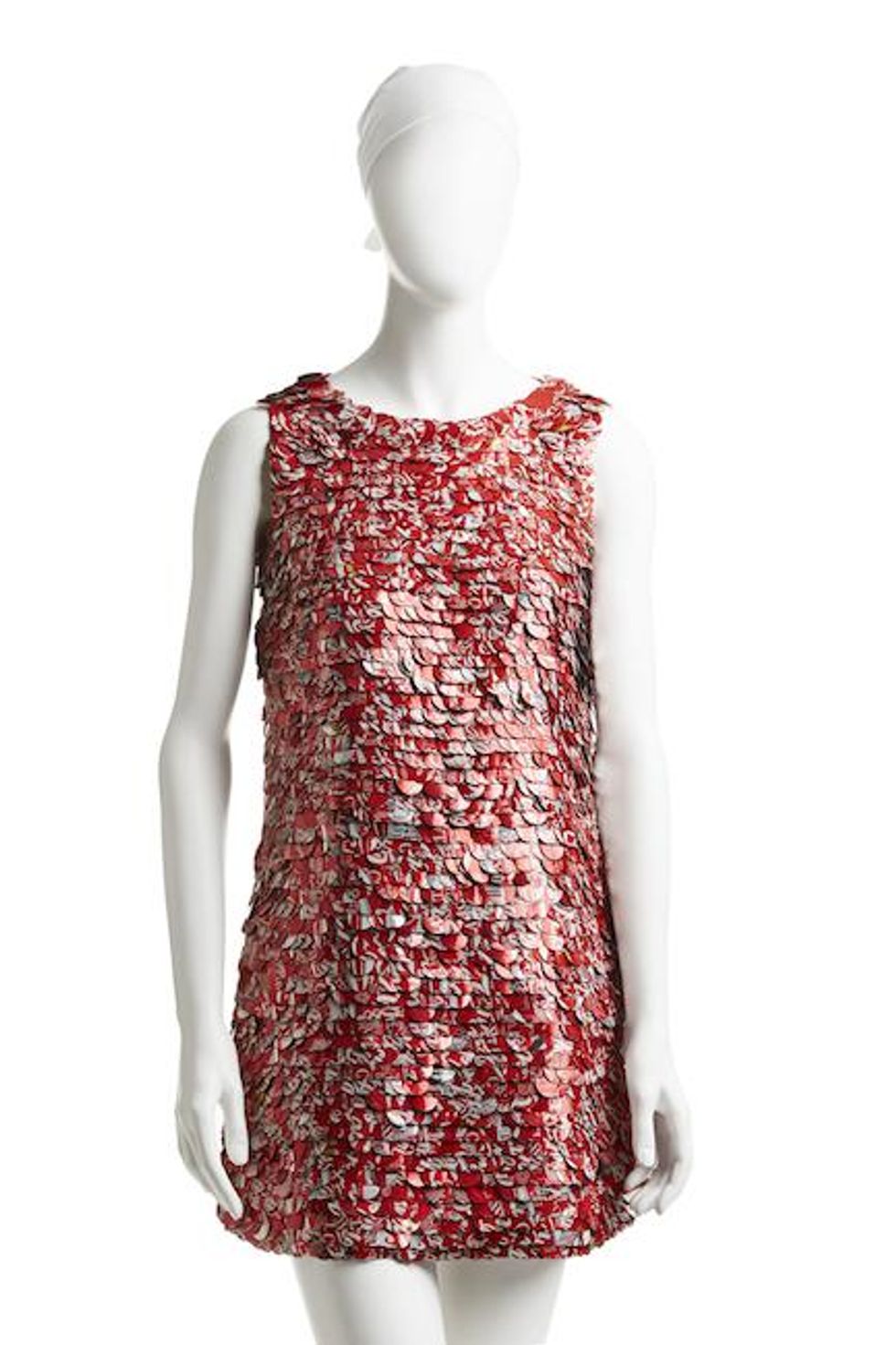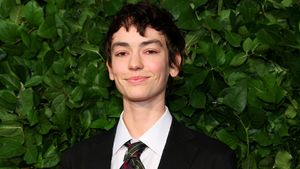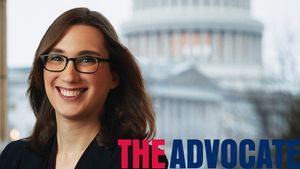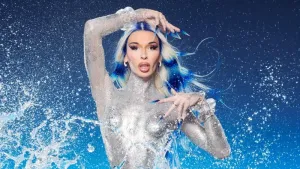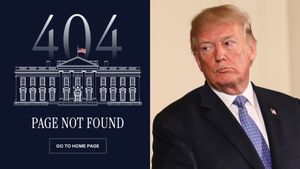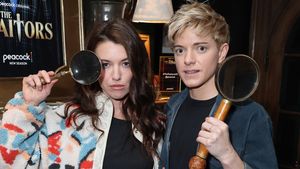More than a fashion designer, Isaac Mizrahi is an American icon. From his show-stopping couture gowns, to his prolific theater work, to his cameos in Woody Allen movies and on television, Mizrahi is one of those ubiquitous New York characters that helped define 1990s culture. A prodigious sketch artist, Mizrahi began working for Perry Ellis in his early 20s, before launching his own label in 1987 with the support of his employer.
His colorful take on women's ready-to-wear was nothing short of revolutionary, and his playful, excessive taste informed the look of a golden era for fashion, until minimalism and conformism took over the runway. Critics weren't always kind to Mizrahi: The premise of his seminal documentary, Unzipped, took place in the wake of a disastrous spring 1994 runway show, which a Women's Wear Daily review slammed as "half done."
The story of Mizrahi's revenge is chronicled in the hit black-and-white film, the first documentary ever to focus on a fashion designer, and resulted in an eye-popping display of puffer jackets, mock fur coats, and sexy mini-dresses worn by the likes of Naomi, Linda, and Cindy. The show was a huge success and turned the budding label into a must-have for the New York glitterati.
Mizrahi's influence is still felt today, as evidenced in a new multimedia retrospective, now on view at The Jewish Museum. At a preview of the show, Mizrahi sat down with Out to answer our most burning questions on his craft, his muses, and his notoriously neurotic lifestyle.
RELATED | First Look at the Exhibition, Isaac Mizrahi, An Unruly Story
Out: It's a wonderful show. I don't think people realize you have done so much in your life.
Isaac Mizrahi: Thank you. I'm so glad you like it. I can never get enough of compliments.
Most people of my generation know you through your Unzipped documentary [streaming on Netflix], which recently celebrated its 20th anniversary. When you made it, did you imagine it would have such a lasting impact on younger audiences?
IM: Honestly, yeah, I did. I thought, 'If this works, it will be a great thing.' But that's not why I did it. I did it because I had no choice --I had to do it.
What do you mean?
IM: Well, I was supposed to do this big benefit in Los Angeles, and I didn't want to do it. So I made them promise to get me Grauman's Chinese Theater, which is this unbelieveable, old world theater there. And that was very easy, they immediately said 'yes' in order to get me to do it. So I got this venue and I thought 'Well, I have to have some kind of movie to show, as part of the show' I need some sort of footage. So we started making this crazy little thing, and it became, after the event, a full blown movie. And I knew it would be good. If I had to kill myself it would be good. But I didn't do it to be good. I did it because of that show. That's funny, right?

You said that you're getting more and more neurotic as you age. I actually think you seem to have calmed down compared to Unzipped.
IM: Oh yeah? Well, that's because you don't see me work, and you don't have my feelings, you know what I mean? You're just watching me. [Back then] I felt more direct, like, if I had something to do, I just did it. I didn't think about all the reasons not to do it, and why I should or shouldn't do it in a certain way, I just acted and went for something. Whereas now, I really got every angle, I can see what's going to take place, and it makes me very neurotic, it does. And also, it makes me better at my work, I think. I forgot to say that, I think I'm better at my job now. Whatever I do, I consider more, and so I do it better. I realize what can go wrong, so I try not to make mistakes. It's like RuPaul when he says 'And don't fuck it up!' --Ok! Thank you for reminding me. I will not fuck it up.
I didn't know about all your theater and television work. Are you happy with how the Isaac Mizrahi brand is doing right now? Has it progressed the way you wanted it to go, or do you feel like there's still work to be done?
IM: I think there's work to be done, you know. But I'm not sure it's so much in the area of apparel, I think it's much more in the area of entertainment. Movies. TV shows. That's going to be the biggest part of the expansion for me, personally. I know the Isaac Mizrahi fashion brand has big plans to expand, and there's a big giant launch of a new brand with the Hudson's Bay Company, which represents millions of stores around the US and Canada, and eventually Europe, and that's very exciting.
But the exciting part for me is this idea of making movies and TV shows, and plays. I did my off-Broadway one man show, Les MIZrahi, for a long time. I did that movie Unzipped. I was in a million Woody Allen movies. And I was on every damn TV shows [He's had an impressive run on Jeopardy!].
As a matter of fact, Andy Cohen came to see the museum show last night. We had a small vernissage. And he emailed me and said, 'It's so great except you forgot to put clips of our TV show.' We made a show together called The Fashion Show, with Kelly Rowland in the first season, and the second season was with Iman. I had forgotten all about because there's a lot! But I feel like I'm on the brink of something very exciting in that area, it makes me feel young again.
And you were a judge on RuPaul's Drag Race too!
IM: Are you kidding me? I've known RuPaul for 30 years! I brought RuPaul to Paris, in 1992 or 1993, I was commissioned to make a handbag for Louis Vuitton before Marc Jacobs took that job. They commissioned me to make a centennial celebratory bag. They celebrated with a huge party at some fabulous Japanese pavilion, I forgot where... Anyway. I had to find an act. I brought RuPaul and she performed. It was fabulous.
I didn't know she wore your leather sequin dress in "Supermodel (You Better Work)"...
IM: And I'm not kidding you, I think that song made its debut at one of my shows. We've known each other for ever. Me and Ru are like that.
Speaking of supermodels, who do you still talk to from your supermodel friends of the '90s?
IM: I don't really talk to many of them. I talk to Christy [Turlington] sometimes. I see her around. I talk to Veronica [Webb] all the time, we're close friends, right. I wish I could talk to Linda [Evangelista] but she won't answer my emails, I don't know why. She just won't answer me.
She needs $10,000 to answer an email...
IM: Haha! Exactly! She doesn't answer an email for under 10 grand, exactly. But I did use to love Linda, because she was quite funny. And Naomi. Mrs Campbell. Who isn't a Naomi fan? You know, my mom once said to me 'You know, Naomi Campbell is so beautiful, I would sleep with her.' My mother said that, ok?
Wow. She's my favorite. Have you ever been star struck?
IM: Many times! Of course, the first one was Liza. And we became friends. I worked for her, I made her clothes, I made her costumes. I love her. And it was her 70th fucking birthday the other day! 70th, right? Speaking of gay icons.
And the other one who I worked with a little bit was Meryl Streep. And that was fabulous. Absolutely fabulous. I love her. I have a rapport with her still, a little bit. I would love to work with her again, because she was very involved. She's not kidding, like, she doesn't just look at something quickly. She takes pain in the way she puts herself together, and she's wildly smart.
Meryl Streep wearing an Isaac Mizrahi gown at the American Film Institute Awards, 2004:
Do you have a favorite dress that you consider your proudest accomplishment?
IM: All of them! No, I mean that. I can't do that, there's nothing of mine that's better or worse. Nothing. No, I love it all equally. It's just like women, they're all beautiful for different reasons.
What about one career-defining moment?
IM: I would say probably the first show I had. I was in business for about a year before I had a show, and for that year I was just in this little studio making clothes with this woman I hired. We were both young girls at the time. She was my assistant and pattern-maker and everything, and then we decided to have a show, and we just did. Seven months later, after working my ass off, making patterns, sewing myself, doing all of it. That show was my pinnacle, that was my moment. It was like the Earth changed after that show.
Was there a moment where you felt like everything was going to fall apart?
IM: Well, you know, being Jewish, and being me, and being from New York, I always feel like everything is going to fall apart. I swear I do. I am not the most optimistic person in the world. I'm very gloom and doom. But I also have a very good sense of humor, so almost everything makes me laugh. Even my dog, who's really old, it makes laugh when he shits all over everything, 'cause it's so funny. Then I have to clean up the shit, but at first it's funny.
What's your opinion on fashion today?
IM: I've always been skeptical of it. For all of its evolution, it's the exactly same thing. There's a French saying for that 'Plus ca change, plus c'est la meme chose.'The more it changes, the more it stays the same. And I really mean that. I can go on for 10 minutes about what's different about it, and then go back the other way and say exactly the same thing.
What are the things you dislike about this evolution?
IM: I miss the element of surprise. Because of social media, everybody is Instagramming or Snapchatting everything every second so by the time you get to the fashion show, there's no point in even sitting there because you know everything you're going to see. I miss this kind of secrecy, the privacy of things.
What's exciting to you right now?
IM: I'm excited by very young people and what they do and consider to be interesting. That's the beginning of something that's going to be established. I'm always interested in the tiniest blogger or journalist and see what they notice.
It's amazing to see how influential you were on fashion. For instance, recycled Coke can garments were everywhere after you launched them in the mid-1990s, even on handbags.
IM: That came from this idea about recycling. It took us three years to make those dresses. We paid homeless people to collect Coke cans and Budweiser cans -- two of my favorite things -- and then 7Up cans, so it was green, red, white, and gold. We split them open and washed them, then shipped them to Paris to Langlois-Martin, who makes these beautiful paillettes, and then they were sent on to India to have them sawn onto panels. It took us years.

The Real Thing (Coca Cola can paillette dress), Spring 1994
RELATED | Sneak Peek: 'Isaac Mizrahi, An Unruly Story' at the Jewish Museum
The colorful furry coats of your seminal Fall 1994 collection [shown in Unzipped] are very now as well, just look at Rihanna.
IM: I don't know her that well, but she wore something that looked a lot just like one of my dress, where she was almost naked [at the CFDA Awards 2014]. We sent her something a lot like that, but it didn't fit her, and I think she was inspired by that. I love her, she's adorable.
If you could do Spring 1994 differently, what would you change?
IM: I don't remember it! [The show was slammed by critics and prompted the beginning of Unzipped] Oh that's the collection that had the Coke cans in it. Darling! It went on forever. It was androgynous. It was this idea of men's clothes that were either tiny tiny or giant. It was all about recycling: You don't buy anything new, you just find old things and put them on. It was very stupid.
It's funny that it ended up being one of the most influential collections. Today's trend is very genderless and thrift-store inspired.
IM: I think so too. Those sketches are crazy. I wouldn't change anything, but looking back, I probably would have made it shorter. Instead of 80 or 120 passages, I would have had 50. But in those days, you had to do certain number of passages, or weren't considered a house. In couture, you had to have certain number of looks or you were not allowed to be shown at Paris Fashion Week. In America, you had to have big giant broad show with a million things.
Fashion shows were a lot different back then.
IM: I think what people liked about my shows is that I used to send six people out at once, I couldn't imagine sitting there, and they liked being bombarded. They were just seeing so much. Now, shows are sort of airless, humorless. Or else it's too funny, and then it's a big joke.
Wait, is that Mejikan [of Dragon Ball Z] on your arm?
No, that's Egon Schiele.
IM: Look at you! He was a big influence on my sketches. Did you notice? I mean, I wish, I wish. I forgot your name already.
Julien.
IM: Julien. Oh, it's my favorite name. I love the name Julian. Did you ever see The Red Shoes, the movie? It's a movie about a ballet company, called The Red Shoes, and the character's name is Julian. It's my favorite movie. You'll die if you see that movie. You should watch it: It's beyond divine. You'll kill yourself, it's so beautiful.
Isaac Mizrahi, An Unruly Story runs March 18 through August 7, 2016. For more information on tickets, special events, and hours, go to TheJewishMuseum.org
